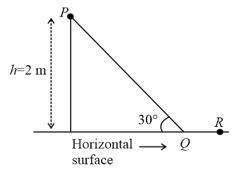Embibe Experts Solutions for Chapter: Work, Energy and Power, Exercise 3: Exercise-3
Embibe Experts Physics Solutions for Exercise - Embibe Experts Solutions for Chapter: Work, Energy and Power, Exercise 3: Exercise-3
Attempt the practice questions on Chapter 8: Work, Energy and Power, Exercise 3: Exercise-3 with hints and solutions to strengthen your understanding. Alpha Question Bank for Medical: Physics solutions are prepared by Experienced Embibe Experts.
Questions from Embibe Experts Solutions for Chapter: Work, Energy and Power, Exercise 3: Exercise-3 with Hints & Solutions
A particle of mass starting from rest, undergoes uniform acceleration. If the speed acquired in time is the power delivered to the particle is
A point particle of mass moves along the uniformly. rough track as shown in the figure. The, coefficient of friction, between the particle and the rough track equals The particle is released, from rest, from the point and it comes to rest at a point The energies, lost by the ball, over the parts, and of the track, are equal to each other, and no energy is lost when particle changes direction: from to The values of the coefficient of friction and the distance are, respectively close to :

A time dependent force, acts on a particle of mass . If the particle starts from rest, the work done by the force during the first will be,
A particle is moving in a circular path of radius under the action of an attractive potential . Its total energy is
A block of mass lying on a smooth horizontal surface, is attached to a spring (of negligible mass) of spring constant The other end of the spring is fixed, as shown in figure. The block is initially at rest-in its equilibrium position. If now the block is pulled with a constant force the maximum speed of the block is :

A block of mass is kept on a platform which starts from rest with constant acceleration upward, as shown in figure. Work done by normal reaction on block in time is :

A particle which is experiencing a force, given by undergoes a displacement If the particle had a kinetic energy of at the beginning of the displacement, what is its kinetic energy at the end of the displacement?
A tennis ball is dropped on a horizontal smooth surface. It bounces back to its original position after hitting the surface. The force on the ball during the collision is proportional to the length of compression of the ball. Which one of the following sketches describes the variation of its kinetic energy with time most appropriately? The figures are only illustrative and not to the scale.
